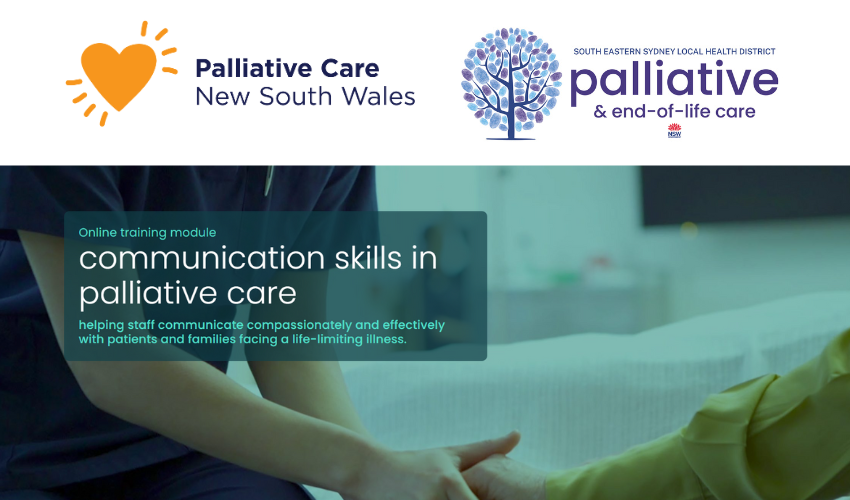Palliative Care NSW is pleased to have partnered with the Palliative & End-of-Life Care projects team at South Eastern Sydney LHD to host this important e-learning resource.
This e-learning resource has been developed to assist nurses to enhance their communication skills in challenging conversations with patients and families facing a life–limiting illness. It has been created by Dr Amy Waters, Staff Specialist Palliative Medicine and Sue Morris, Palliative Care Clinical Nurse Educator at St George Hospital, Kogarah using funding from the NSW Ministry of Health through the NSW Health Palliative Care Education and Training Program, supporting the workforce to enhance knowledge and skills in palliative care.
“By providing open access to this online module, our goal is to further support anyone working in health and aged care to have the confidence to communicate compassionately and effectively with patients and families facing a life-limiting illness.” says Kirsty Blades, CEO Palliative Care NSW.
“What I really like about this e-learning resource is that it focuses in on four key skills and presents them in an engaging and interactive way with illustrations and videos. Once you have completed the module you will also receive a certificate of completion”.
What can you learn?
The module covers four key communication skills that can be used in a range of challenging clinical interactions. While this resource has been designed for nurses, the skills covered can be useful for any clinician and can be used not only in conversations around life–limiting illness but in other challenging clinical conversations and even in conversations in our daily lives.
The module should take 30-60 minutes to complete. At the end of this module you should be able to apply these communication skills in your clinical practice.
Communication as a key clinical skill in nursing practice
Communication is deemed a core competency within the Nursing and Midwifery Board of Australia ‘National Competency Standards for Registered Nurses’ and good communication is not only essential for effective, compassionate and patient-centred nursing practice but is inherently linked to safety and quality in healthcare
Communication between nurses, their patients and families often occur simultaneously with other nursing tasks such as medication administration, health care education or personal care. This means nurses spend more time than other health care professionals with patients and are in a unique position to recognise and respond to psychosocial concerns which can add valuable information to the clinical data we collect about a patient.
However, research has highlighted nurses often lack confidence with verbal interactions and their ability to meet patients’ psychosocial needs. Communication with patients and families with life–limiting illness, dealing with heightened emotion, identifying goals of care, and discussions around prognosis and end of life care were cited as being particularly difficult .
Conversations about life–limiting illness and end of life care are challenging. They can involve intense emotion, which we often feel under–equipped to deal with. Talking to an emotional patient or family member can bring on our own emotional reactions. Discussing end of life issues can be confronting for us as well as our patients. The skills we will cover in this e-learning course can help nurses navigate these difficult conversations effectively and efficiently.
To complete this module click HERE.
An online session was co-hosted by Palliative Care NSW and South Eastern Sydney LHD to provide more information about the newly developed e-learning module to support communication skills in palliative care.
- A demonstration of the resource and its embedded learning tools
- Insights into the benefits of enhancing communication and skills for addressing difficult end-of-life conversations
- Practical guidance on how to effectively use the resource within teams
Watch the recording HERE.


